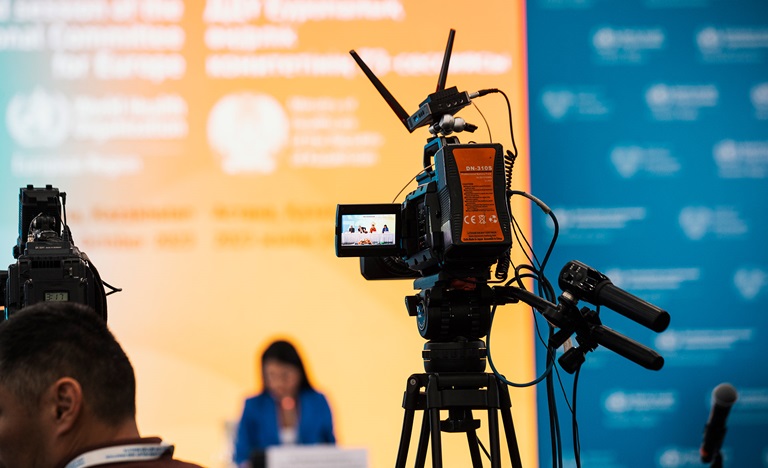
Newsroom
Media Contacts
![]()
WHO/Europe Press Office
Email: eupress@who.int
Latest news
All →Personal story – Syrian case worker Mohamad: “I want to give back to the community”
Just over a decade ago, Mohamad Yumn Alhayek’s plans for the future seemed clear-cut: graduate from the University of Aleppo as a trained physiotherapist; find a job; start a family. But the war that erupted in 2011 turned his life and the lives of millions of other Syrians upside down.
Mohamad did indeed graduate from university but was forced to flee and build a new life from scratch. He found refuge and safety in Turkey, and managed to obtain a work permit. Today Mohamad is employed by the Refugee Health Training Centre in Kucukcekmece, Istanbul, which provides primary health services to Syrian refugees in Turkey.
Refugees assisting refugees
“At the Refugee Health Training Centre I started not as a physiotherapist, but as a social worker, as my Syrian degree was not recognized in Turkey. Today I am a case worker. This means I provide support for Health Centre beneficiaries from all age groups, with their various special health needs”, Mohamad explains. “My job includes everything from making hospital appointments to accompanying beneficiaries during their hospital visits and arranging necessary referrals between health institutions, according to each person’s specific needs.”
Mohamad was hired as part of the project “Supporting the employment of Syrian personnel in the Turkish Health Sector”, founded in 2018 with financial support of the Government of Germany through KfW Development Bank, and run jointly by the Turkish Ministry of Health and the WHO Country Office in Turkey.
“Through this project I found a job through which I can not only contribute and use my skills, but also help others who have had to flee”, Mohamad says.
Persons behind numbers
Although a refugee himself, Mohamad admits he had rarely reflected on the plight of his fellow refugees, as he had to flee Syria early in the war.
“They were numbers. I did not know about the condition or plight of refugees before”, he says. “Now I do. Being involved in this work, communicating with the refugees very closely, it feels very heavy, very painful for me, as the experience of war is a pain we all share. Every person has a story, and it is often a heartbreaking one.”
Reflecting on one of his cases, Mohamad adds, “There is a small child who suffers from multiple sclerosis, for example. He is on his own. There is no one to look after him, so I take care of his needs as well as I can. It is very hard to see him like that.”
In addition to his work at the Refugee Health Training Centre, Mohamad is studying to obtain an equivalency for his physiology degree at a private university in Istanbul. When a question about significant moments in his daily work comes up, Mohamad’s face lights up with a warm smile. “Whenever I have been able to help a child, a mother or a father, whether it is with a doctor’s appointment or getting someone their medicines or diapers for their baby, … when their faces shine with happiness and relief, I feel absolutely delighted.”
Rebuilding a life
Like his fellow countrymen and women, Mohamad has suffered personal loss and grief. Four years after he arrived in Turkey, his father died in the war in Syria. Mohamad remembers that moment as a turning point in his life. “At that moment, I became the person responsible for providing for my whole family”, says Mohamad. “That was the second time my entire life was turned upside down.”
But Mohamad did not let his grief stop him from moving forward. “I was working at multiple jobs at the same time, for very long hours and without rest, so that I could give my younger sister and brother the opportunity to pursue an education.” Thanks to Mohamad’s hard work and dedication, his siblings were able to begin their studies at Kayseri University.
His hard work also paid off on a personal level when the Government of Turkey approved his application for citizenship.
“I was immensely grateful. It helped me rebuild my life. In 2018 I submitted an application to the Refugee Health Training Centre in Istanbul for the social worker post, and the rest is history. I am now happily married, and my wife studies at Istanbul University. It feels good to be able to give something back to the community. Luckily, I still have my mother. I spoke to her just a few days ago and I told her that I would do everything I can, wherever there is a need for it”, he adds.
Partnering for health
With the financial support from the Government of Germany through KfW Development Bank, WHO has been conducting the project “Supporting the employment of Syrian personnel in the Turkish health system” since January 2018. As part of the project, WHO provides:
- support for the provision of medical services in Refugee Health Training Centres;
- outreach and facility-based psychosocial services and health education to refugees by hiring and coordinating psychologists, social workers, outreach workers and nutritionists;
- referral services by hiring case managers and bilingual patient guides;
- support for older refugees and those living with disabilities by hiring home care staff; and
- on-the-job training for staff and group sessions for home care providers with the assistance of psychologists.




